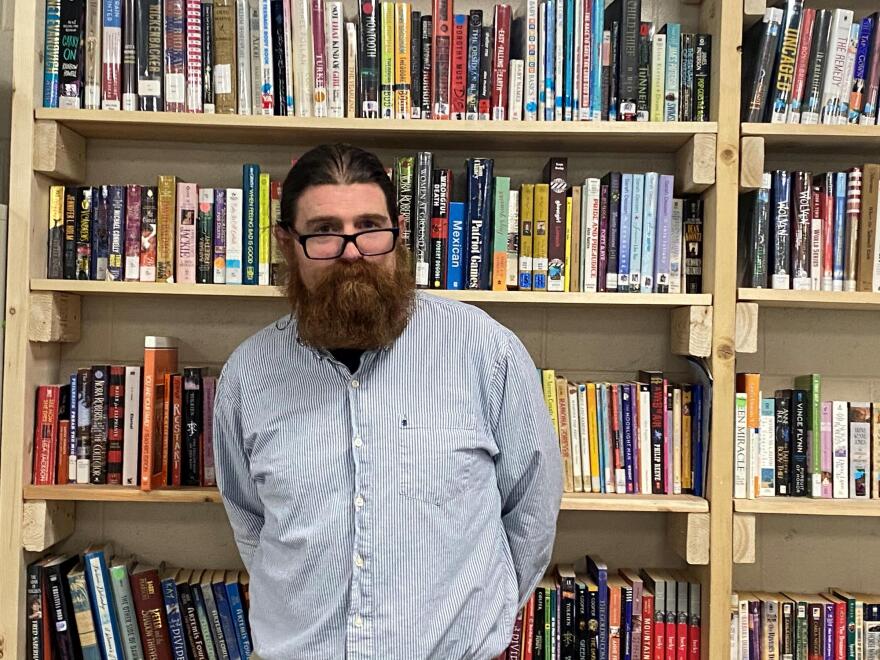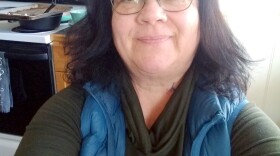This month, NHPR has been checking in with Granite Staters to see how they're doing and what they've learned after so many months of the pandemic. It's part of an end-of-year series we're calling Hindsight.
In the spring, NHPR talked with Bryan Kelliher, the principal at Bud Carlson Academy, an alternative school in Rochester. At that point, the state had recently ordered schools to close and educators were grappling with remote learning for the first time.
Morning Edition Host Rick Ganley caught up with Kelliher recently to chat about how he and his students are doing now.
Sign up here for NHPR's newsletter for coronavirus updates in New Hampshire.
Rick Ganley: Now, the last time we talked, Bryan, your students were all remote. How have things changed since then? Do you have anybody back in the building?
Bryan Kelliher: We do. We were able to start the year with all the students being back and with the students having the option of being remote. And I think probably about two-thirds of our students were back for September and one-third was remote. And then the whole district went to remote really for the holiday season. But the district was allowing for targeted students to be able to still be here. And they allowed all of our students to be able to be targeted. But I'm probably down to a third of the total population is here with now two-thirds being remote.
Rick Ganley: When you say targeted students, are you saying students that have particular special needs?
Bryan Kelliher: Yeah, it could be students who have special needs based on, you know, IEPs. It could be students who have special needs based on homelessness factors, or WiFi issues or just a home situation where it might be difficult to be able to work remotely.
Bryan Kelliher: And Bud Carlson Academy serves students who didn't succeed in a typical high school environment. Your school has a different approach to learning. How have those approaches been working with the remote learning model and during the pandemic in general?
Bryan Kelliher: So the last year, as far as working with the at-risk students and the training that we've done with the staff on becoming a trauma-skilled school, when the students were back with that focus on connecting and creating a space where there is structure and routine. But really working on the relationship piece, knowing that we could be going back remote at any moment, trying to make sure that the students have some feeling of autonomy and control, even though this is a time when many of us are feeling that lack of control with sort of the COVID type crisis. Really just being present for them and providing emotional check-ins as well as ways to self regulate. The staff had good training with that.
We were able to work on that in the beginning of the year. And I think that for the students who were here in the beginning of the year, as well as the students who continue to be here now, we've probably seen greater academic gains than we do when it's a little busier of a school, if you will. The students are able to focus on and really get a lot more immediate help with their educational goals.
Rick Ganley: I want to talk a little bit about those students who aren't in the building, though. You said back in the spring there were issues with locating some students. There were concerns with housing, food insecurity. Some of these students being in school is actually a safer environment for them than being home full time.
Bryan Kelliher: That's right.
Rick Ganley: I mean, what are you hearing from students? Are you hearing from them?
Bryan Kelliher: Well, there's some students that we're always struggling to find and get in contact with still. And I think we're having a little better luck with the students who we were able to make a connection with earlier in the year, or make a better connection with parents earlier in the year. With some of the students who started the year remote, they are difficult to track down. They are difficult to find. We've had a couple of families who, they're always on the edge, housing security wise. Those families have been a little harder to find. So that takes sometimes driving out and bringing things to families or hooking up situations where they can come in. But it has done a lot of educational damage to those students, I would say for sure.
In fact, the students who are here every day, whenever we have our both in-person and remote weekly meetings with students, the students who are here every day are encouraging the students who are working remote to come in, because I think that that sense of structure, that sense of security, it's working for them. And they can tell that for some of the students who aren't coming in, it's not working for them. That peer-to-peer encouragement always does a lot more than any teacher-to-peer encouragement.
Rick Ganley: Has this year of challenges changed how you think about education or how you want to approach learning as you go forward?
Bryan Kelliher: It's been nice to see a lot of, you know, myself as well as the teachers here, really trying to come up with new ways to connect with students and really seeing what's most important. I think that you move away from trying to keep the students busy for 45 minutes or an hour, which can sometimes happen when you're a teacher, towards, hey, how can I connect and what's really important for them?
I think working with a group of students who have been impacted by trauma, many of them for their whole life, for a lot of teachers, this national trauma of the COVID crisis is really a pretty new trauma. And I think especially in starting the year, I think teachers were a lot more worried than the students were when it comes to, you know, how to have a safe environment or even like, all right, so I can wear my mask, wash my hands. Like in some ways, because the students, having had, I think, so much experience with trauma, there's something to be learned from them as far as how to handle what really has been a long-term crisis.









